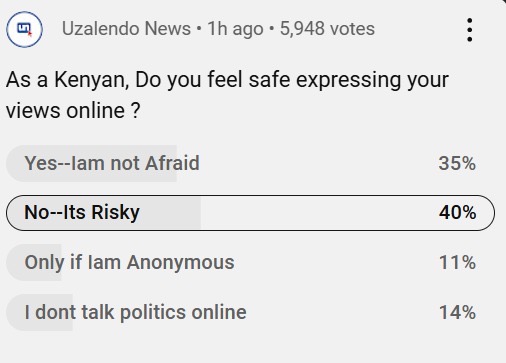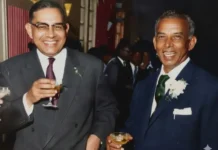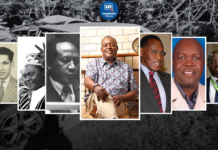Kenyan internet users are growing increasingly apprehensive about expressing their opinions online, following a troubling incident involving a teacher’s death after criticizing police leadership on social media.
A recent poll conducted on the Uzalendo News YouTube platform highlights a deepening climate of fear surrounding digital expression in Kenya.
With over 5,948 verified responses, the survey found that 40% of respondents consider it “risky” to voice their views online, signaling a chilling effect on free speech.

The poll also revealed that 35% of Kenyans still feel safe sharing their opinions, while 11% rely on anonymity to protect their identities online.
Additionally, 14% avoid political discussions altogether, underscoring a broader trend of self-censorship driven by concerns over state retaliation.
Freedom House “Freedom on the Net 2024” scores Kenya at 3/4 for media self-censorship, noting journalists and online commentators actively moderate speech due to risks of gag orders, defamation suits, and pressure from authorities
This sentiment has been exacerbated by the recent case of Albert Ojwang, a teacher who was reportedly arrested and later found dead days after posting a social media message criticizing Deputy Inspector General of Police, Eliud Lang’at.
Ojwang’s final post accused police leadership of misconduct and intimidation, and its subsequent removal from social media platforms has fueled fears of government surveillance and censorship.
Human rights organizations and civil society groups have called for an independent investigation into Ojwang’s death, warning that such incidents threaten to set a dangerous precedent for online activism and free expression in Kenya.
In addition to the Ojwang case, recent government actions have intensified fears of repression. Last week, Rose Njeri, a Nairobi-based software developer and digital activist, was arrested after creating a tool that allowed users to send emails opposing the proposed Finance Bill 2025.
Prosecutors accused her of violating cybercrime laws by enabling mass communication to the national assembly’s finance committee. Njeri was released on bail, but her detention sparked widespread anger and concern over increasing restrictions on online activism.
Government officials must remember that not every tweet is hate speech. Not every meme is defamation. Criticism is a pillar of democracy. If leaders can’t be questioned, then governance becomes dictatorship.
When Does Critism Germinate into Insult
However, Kenyans have long been accused of ‘overstretching’ their criticism that often turn into insults and immoral attacks on personalities.
University student David Oaga Mokaya is facing trial over charges related to sharing misleading images depicting President William Ruto at a State funeral procession.
Murkomen has threatened action against Kenyans using social media to troll political leaders and criticise the government.
The CS, who spoke in Uasin Gishu while in the company of President William Ruto, referred to the Artificial Intelligence (AI) generated images which have become a playground for online users opposed to the government.
“There are those making those pictures with our leaders in coffins; I want to ask every parent, particularly church leaders, to defend this bad behaviour. If your child goes to school and another child whom they share the same class sends a picture when your child has been put in a coffin, will you still defend that behaviour?” Murkomen posed.
However, Kenyans online have argued that the insults are a result of a variety of factors including anger, powerlessness, and digital courage.
But there’s a thin line between bold critique and destructive abuse.
You can challenge corruption, injustice, and poor leadership without resorting to name-calling, threats, or tribal slurs.
A sharp argument always hits harder than a dirty insult. Your voice carries more weight when it’s focused, factual, and fearless — not foul.



















